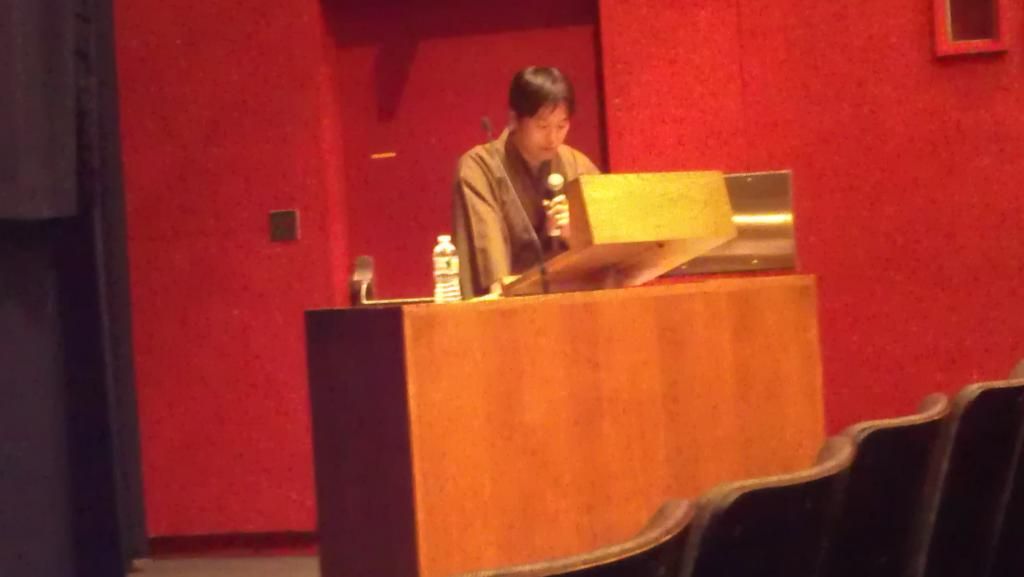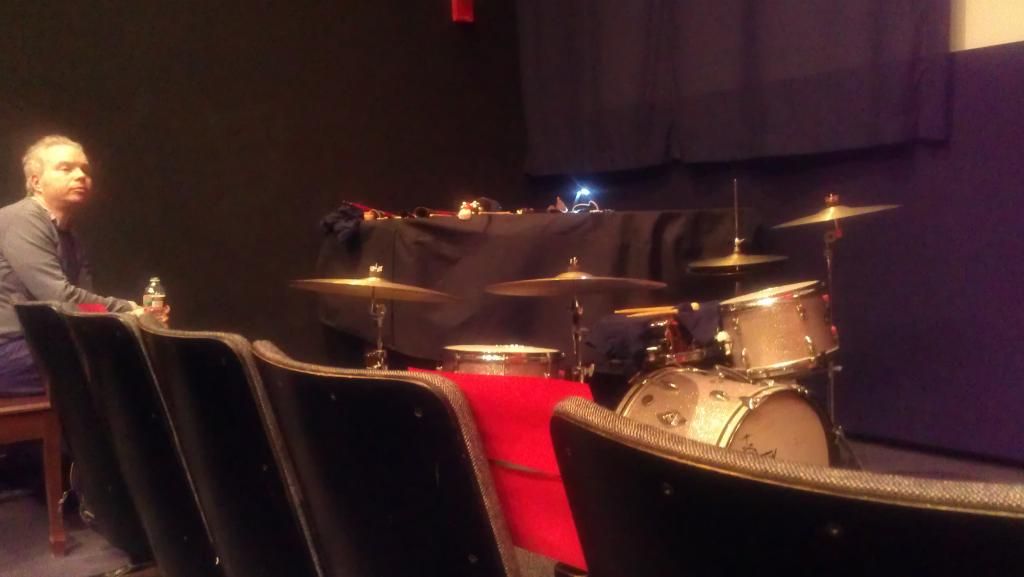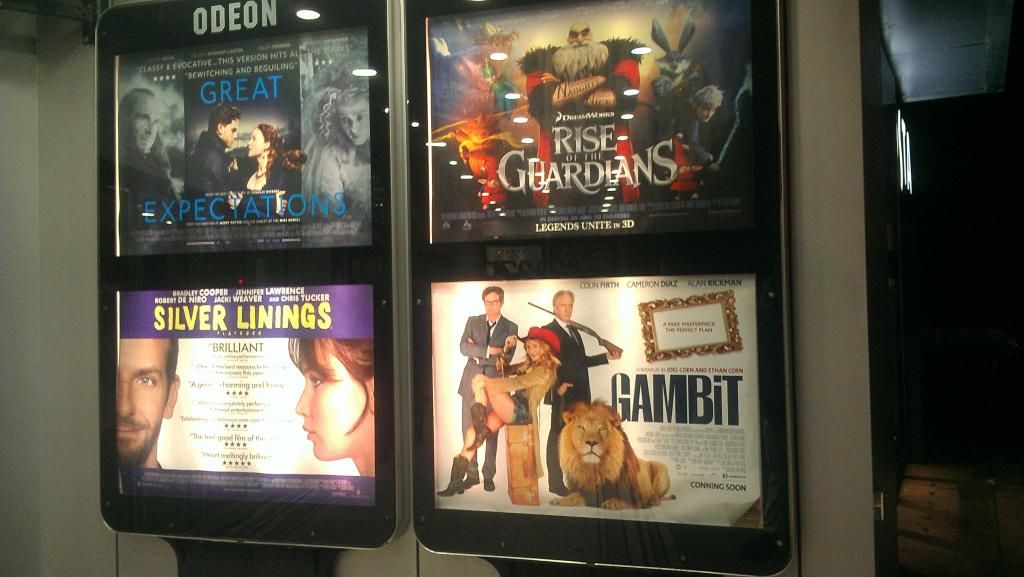"Mainstream movie geeks" seems like a strange thing to say, but it is a thing. You know you're not quite in that group, though, when the new thing that every genre movie site has been raving comes out and you're like "but... silent movies with Japanese narration!"
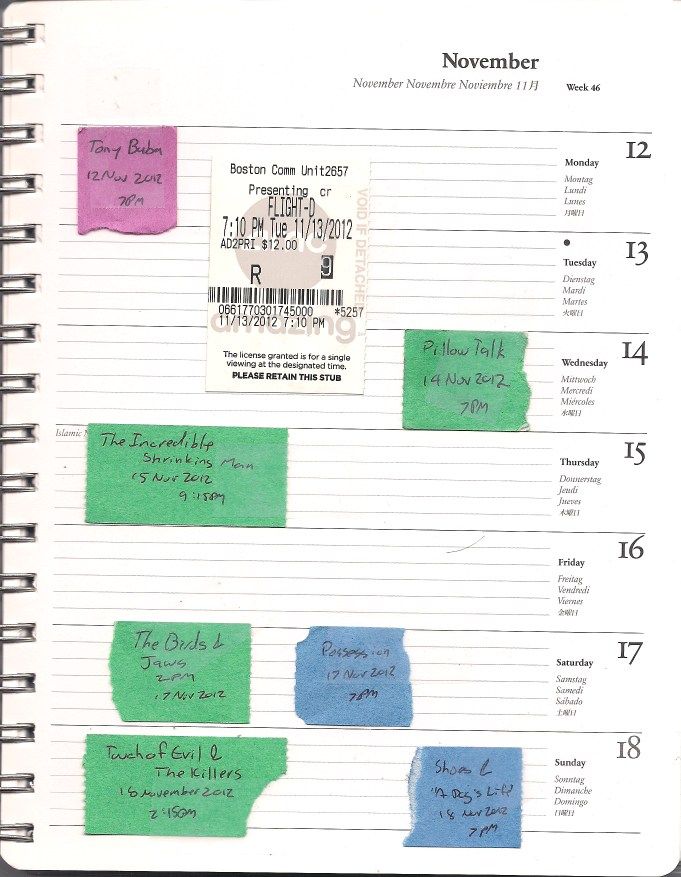
Stubless:
Waiting for Lightning, 10:00am on 18 November 2012 in Coolidge Corner #2
Universal is still turning 100, which means there are still new prints showing up at the Brattle, which means that Usher membership that gets one admission to everything gets a workout with
Pillow Talk,
The Incredible Shrinking Man,
The Birds,
Jaws, the restored cut of
Touch of Evil, and
The Killers. Happy birthday to all of us!
Universal's anniversary also ties into the special screening on Sunday night, in a way -
Shoes is presented as a follow-up to
Where Are My Children?, which was to be part of the Universal series but didn't arrive; here, the focus was on presenting silents with
benshi narration, a pretty neat experience thanks the
benshi Ichiro Kataoka. That was the end of a long day at the movies, starting at 10am with
Waiting for Lightning at the Coolidge, so you will perhaps forgive me for not capping it with
Miami Connection afterward.
Paramount's hundredth has been much less fun than Universal's, but the anniversary logo was stuck on
Flight, a pretty-good return to live-action cinema from Robert Zemeckis. Somewhere in there, I also saw
Possession, an impressively deranged flick from 1981 that got cut to ribbons on its initial US release.
The first ticket in the books for this week, though, was for
"An Evening with Tony Buba", on the schedule as part of CineCache but not drawing much of that series' usual group (although the DocYard crowd made up for it. I nearly gave it a pass, planning on hitting the Coolidge's "Science on Screen" presentation instead, but just working a bit late in Burlington makes a 7pm show in Brookline almost impossible. That was okay, though; like the Japanese
benshi, learning of a Tony Buba and seeing him in acction helps make film fandom more interesting.
Buba, you see, is a documentary filmmaker who has spent a fairly lengthy career chronicling life in his hometown of Braddock, PA. Many of those films have been shorts, shot in black and white on 16mm film, the work of a craftsman who focuses on something he feels passionate about rather than necessarily trying to propel his career to the next level. It's a sort of work that, I suspect, will never sell a lot of DVDs or get a lot of hits on media streaming sites as entertainment, but will be tremendously valuable to future generations who want to understand what life was like in this part of the country at this time. There's a reason home movies are as often added to the National Film Registry as commercial works - they're informative in ways beyond the predictable - and Buba's work, especially in the two shorts screened, is illuminating in the ways of an amateur work but with the clarity of the professional's, without ever seeming like he's altering the picture.
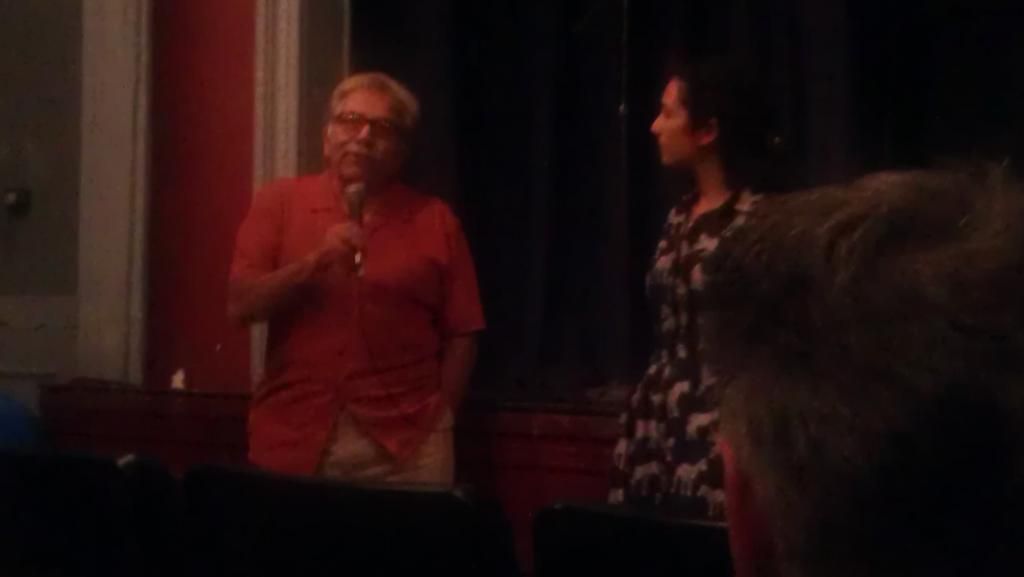
Speaking of pictures, that's Mr. Buba on his first visit to Boston, doing a Q&A moderated by Rebecca Myers (nice to see her again after ArtsEmerson scaled back its film program). He's a little grayer and softer than the guy who pops up in the movies screened; the most recent,
Lightning Over Braddock, was from 1988. He turns out to be quite the affable fellow, sharing some stories of working with Pittsburgh's other great independent filmmaker, George Romero, giving updates on the people in the film, greeting old friends, and telling a story about how he was offered the job of editing
Roger & Me but turned it down because he was looking for money up-front instead of on the back-end, since it's not like documentaries ever make any money.
Lightning Over Braddock: A Rustbowl Fantasy
* * * (out of four)
Seen 12 November 2012 in the Brattle Theatre (CineCaché/DocYard, 16mm)
As a result, I kind of wish I was more able to love
Lightning Over Braddock. It's a fascinating sort of movie, made during the mid/late-eighties when the transformation of America's "Iron Belt" to the "Rust Belt" was starting to not just pick up steam but be noticed by the greater population. This enables Buba to make a feature, but he doesn't want to make one that gets lost in the crowd or makes his beloved home town seem generic.
So he makes a movie that is more about the making of a movie about Braddock than actually being that thing, and that's kind of fun. I suspect that it's even more fun for those who have seen more of his previous work; many of the main figures in this movie have been the subject of Buba shorts, so the effect might be like a writer pulling everything he does together, with the added kick of Buba stepping back and talking about the process and parodying the endeavor. It doesn't hurt that he has cultivated an enjoyable cast of characters over the years, especially Sal Carollo. Sal's a hustler with an inflated idea of his own popularity and the fame and fortune to come from independent documentary films, and Buba has fun staging scenes where Sal gets riled up even as he has to deal with the guy being quite erratic.
I think doing something feature-length gets away from Buba a bit, especially since
Lightning Over Braddock is in many ways the story of a man looking for a story, and I kind of got the idea that it would have gone on forever if Sal hadn't thrown a monkey wrench into it by the end (even then, it sort of wanders aimlessly for a bit, though the cameo by George Romero is fun). It generally works; when all is said and done Buba has both given a snapshot of Braddock and sent up snapshots of places like Braddock as a documentary genre. I just found myself a little more fatigued at the end than a long work-day would explain.
Flight
* * * (out of four)
Seen 13 November 2012 in AMC Boston Common #9 (first-run, digital 4K)
Robert Zemeckis is not a subtle guy; the first song on the soundtrack of this movie about a man battling addiction issues is "Alcohol" by Barenaked Ladies (though I doubt many radio stations today would be playing it when an alarm clock goes off; was it ever even released as a single?), and it's not the last on-the-nose music cue in that scene, let alone the film as a whole. It's pretty clear where he's going with this from the start.
It's still pretty enjoyable in the details, though. The crash-landing and everything leading up to it that really puts the story in motion is the sort of technical challenge that Zemeckis has spent his career diving into (I half-wonder if his return to live-action was as much motivated by the desire for new challenges as studios shutting down motion-capture projects), and he's good at that sort of thing, making it tense and impressive without the flash getting in the way. After that, it's Denzel Washington's show
Washington is good at this sort of thing; he's able to project the charm and capability that doesn't blunt the character's arrogance at all but makes it tolerable. The comparison between Washington's Whip and fellow addict Nicole (played by Kelly Reilly) is pretty simple - her near-death experience frightens her to the core, while Whip being initially shaken doesn't take, as he's too certain that he's capable of handling anything. What Washington does is get us to believe that he has a better nature underneath the impulsiveness and selfishness, and Zemeckis does a nice job of making sure the film doesn't drag as we see bits of that underneath Whip's uglier qualities.
Pillow Talk
* * ½ (out of four)
Seen 14 November 2012 in the Brattle Theatre (Universal Centennial, 35mm)
Sometime, someone is going to explain the charm of movies like
Pillow Talk to me. Visually, I get it; the bright colors pop in widescreen Technicolor, there's a good-looking cast with a fair amount of charm, and a good line or two. But get right down to it, and the story involves a selfish jerk (Rock Hudson) who responds to the valid complaints of the woman who shares his party line (Doris Day) by seducing and taunting her, in the process screwing over his best friend (Tony Randall)... And we're apparently supposed to root for the pair to get together?
Ehhh, no. Maybe if Hudson's and Day's characters were a bit more interesting, but they're sort of blanks. Amusing and good-looking enough, sure, but between them having a hard time showing as much personality as Tony Randall does; he's at least entertainingly dry. The music's good, too, if shoehorned in.
It's funny; I like
Down with Love, which is an homage to this sort of movie, but the personalities are more fun.
The Incredible Shrinking Man
* * * ¼ (out of four)
Seen 15 November 2012 in the Brattle Theatre (Universal Centennial, 35mm)
The Incredible Shrinking Man is a B-movie through and through, even if it strives for something more elevated in the final moments. It is, however, one of the very best of the B's. The filmmakers do an impressive job of generally playing the story of a man shrinking down to nothing straight even if it is kind of a goofy idea, and not overstating the size of the movie. The focus stays squarely on the title character, and doesn't become a bigger story than its characters are suited for.
As absurd as the story is, director Jack Arnold and company execute fairly well. The moment when Scott Carey (Grant Williams) is exposed to a strange mist is appropriately eerie, and the oversized sets and props used to throw off one's sense of scale as Scott shrinks are as good as you could hope for. It's not going to trick anyone into thinking it's real, but it looks just mismatched enough to sell the audience on how Scott no longer fits into the world around him. He's not the world's greatest actor, but it's not like he has a huge range of emotions to portray, and he provides fair beefcake when he's shrunk too small for clothes.
Richard Matheson adapts his own novel, and there are times when he seems to love his words a little much - the only bit of narration that really feels necessary is the last bit, which gives the movie a grandeur that it might not otherwise have; much of the rest is clumsy (although sometimes hinting at interesting story elements that aren't fully followed up). The adventure elements in the basement are pretty terrific, though, making a spider a genuine threat.
The Birds
* * * ¾ (out of four)
Seen 17 November 2012 in the Brattle Theatre (Universal Centennial, 35mm)
The Birds is a lot better than I remember, but what surprised me when watching it this time around is just how ahead of its time it is. It's hardly the first nature-gone-amok horror movie, but its construction is surprisingly modern: Extended getting-to-know you at the start, occasional quick-cutting, and an explosion that seems somewhat shoehorned in. I'm not necessarily complaining about this - Hitchcock was really inventing the modern horror movie here and in
Psycho, and it's kind of thrilling to see: Even as much of
The Birds is a slow burn, the occasional choppy, frantic feeling heightens the usual panic, and the gas station explosion is one of the best of the type, especially with the broad, overhead views Hitch gives us.
Of course, a little bit of "ahead of its time" is "special effects are not quite where they need to be yet". A lot of the blue-screening is fairly rough, and not all the birds are convincing in close-up. If Hitchcock had a bit of later technology at his disposal, he would have made something even more amazing. But what he's got is plenty good; the way he fills the screen with birds whose malevolence is ready to explode makes how things look when it actually happens just an enhancement.
It's a nice cast, too. Tippi Hedren is not just stunningly beautiful, but makes a kind of shallow heroine a lot of fun to watch. Rod Taylor makes the man she follows to Bodega Bay charming but kind of simplistic in the way he tries to grab moral high ground. The whole group is great fun to watch together; they'd be fun to watch even if there wasn't the potential for birds to attack out of nowhere, which makes for a great foundation when the horror erupts out of nowhere.
Jaws
* * * * (out of four)
Seen 17 November 2012 in the Brattle Theatre (Universal Centennial, 35mm)
Jaws, similarly, is better than I remembered, and I remember it being pretty darn good. One thing I always forget is just how fast the thing moves: The first shark attack comes right at the top, there's just enough "trying to save the Fourth of July" material to give the whole thing some context, and then all hell breaks loose, leading to the final act which is arguably the the reason you have the rest of the movie: Brody, Quint, and Hooper on the boat, hunting the shark while showing just what a motley crew they are.
And that last act is
fantastic. There are a lot of things that go into making it that way: Spielberg, even at this early point, could direct the heck out of an action scene, and the way he feeds the audience just enough information about how everything on board this ship works so that nothing ever seems to come out of nowhere. More directors should re-learn that a great deal of suspense comes from knowing characters' limits and that of the things around them.
Roy Scheider, Robert Shaw, and Richard Dreyfuss play off each other amazingly well; it's kind of amazing how the dynamic goes from Brody and Hooper feeling frustrated by the seemingly-insane Quint to Brody being the outsider as the two nautical types bond. They're none of them complicated characters, but the audience understands who they are perfectly, and they seem like much more complete people than the simple archetypes they could be.
Also worth noting: The new 35mm print the Brattle had (struck for the anniversary series, and likely the basis for the new DVD/BD) is pretty darn gorgeous. I suspect that I've seen the shooting stars in this movie before, but they're a great example of just how clear the image is.
Touch of Evil (restored cut)
* * * * (out of four)
Seen 18 November 2012 in the Brattle Theatre (Universal Centennial, 35mm)
It boggles the mind that Universal originally cut the long tracking shot at the beginning of
Touch of Evil and overlaid the main titles; it's such a great shot from the very first bit, where the guy slides into the frame and sets the timer on the bomb in a bit of showmanship that the movies generally try to avoid but which is such a perfect kick-off for such a flashy sequence.
That's just the start of a pretty darn great movie, perhaps the greatest example of the type where who the murderer is winds up being far less important than how he's pursued, with Charlton Heston's upright Mexican Federale Miguel Vargas a sharp contrast with Orson Welles's corrupt local American cop, while the gangsters "Mike" is trying to covict attempt to use wife Janet Leigh for leverage. That's the cat-and-mouse game one remembers at the end, with the resolution of the murder itself almost an afterthought.
Most of the fun, naturally, comes from watching the cast work off each other in this situation. Heston is smooth and righteous without being a prig, and the idea that Welles's uncouth drunk would look down on Vargas is absurd but tragic. Leigh is kind of a gas as Miguel's American wife - the way she acts in the movie implies the sort of rebellious streak that can come from being comfortably well-off; it's never said that her marrying a Mexican detective was scandalous for her Philadelphia family, but you can tell she would have enjoyed that feeling. Then there's Joseph Calleia as Welles's loyal partner, whose bluster becomes almost tragic when he realizes that he's perhaps been willfully ignorant.
At some point, I'll have to watch the original theatrical cut (this "memo version" has almost completely displaced it). I'll probably like it, because the story itself is a good one, but I suspect the focus will be more on the mystery rather than the detectives, which isn't the most interesting part.
The Killers
* * * ¼ (out of four)
Seen 18 November 2012 in the Brattle Theatre (Universal Centennial, 35mm)
Similarly,
The Killers is a somewhat unconventional murder mystery, although it's the telling that is less typical as opposed to the characters. After all, star Burt Lancaster is dead by the end of the first act, and we'll learn his story in flashbacks as insurance investigator Jim Riordan (Edmond O'Brien) traces his story back.
It's a corker, filled with double-crosses, stolen loves, and a caper gone quite wrong. Lancaster's Ole "The Swede" Anderson is never quite a hero, but more the sort of big dumb lug who gets in way over his head because as much as he doesn't mind breaking the law, he's not the sort of inherently ruthless person his rivals are. It's easy to see why he falls for Ava Gardner's Kitty, even if she's not exceptionally sketched-out.
One of the reasons that
The Killers really succeeds is that both the present-day and flashback scenes are equally enjoyable. Lancaster and Gardner are jumping through the film noir hoops as well as can be expected, but it's just as much fun to watch O'Brien and Sam Levene (playing a cop who knew The Swede back in the old days) become friends and work off each other on a quest not so much to save The Swede's good name or recover money for the insurance company as do one last good thing for a guy they've grown fond of, despite either years having past or their never meeting. It's a remarkably upbeat way to frame a story that is inherently tragic.
Shoes
* * ½ (out of four)
Seen 18 November 2012 in the Harvard Film Archive (Tadaoka Ichiro: Benshi, 35mm)
Here's an odd thing to ponder when watching films from a hundred years ago (and thinking of the society of the same time): Spending all one's time
reading evidently was the mark of a useless layabout, as it is with the main character's father, who avoids looking for work and spends what little money daughter Eva brings in to the family on novels. They're not even particularly labeled junk or pulp; it's just that he's reading!
The story itself is simple enough - the daughter who is the sole person supporting a poor family wants a new pair of shoes, and it's gone well beyond just vanity - what she wears is so close to falling apart that one strongly suspects that she won't be able to keep the job much longer if they frown on working barefoot; it seems like a reasonable investment for the family, really. But there's always some reason to put it off and they take her for gratned, so what scandalous thing will she do...?
In some ways, it's almost comical just how horrified the reactions are in the end, even if the guy in question has been built up as vaguely scummy. The main problem with the mmovie, really, is that for "a film in five acts", it feels like it could be compacted to a short with little damage; the characters just don't do very much other than restate their poverty and the father's laziness again and again. Director Lois Weber actually does a fairly impressive job of not making this drag and the movie runs just under one hour, but the breathlessness of the scandal and the earestness of the opening titles makes for a strange time capsule.
"A Dog's Life"
* * * ½ (out of four)
Seen 18 November 2012 in the Harvard Film Archive (Tadaoka Ichiro: Benshi, 35mm)
I'll get into this a little more when I get around to reviewing both nights of
benshi-narrated silents, but you really haven't seen a Chaplin film until you've seen it with a Japanese guy narrating and performing dialogue for the characters. With the fast-talking way Kataoka-san rattled off what he imagined the Tramp saying, it was almost like a Popeye cartoon at times.
Even without that, it's still a very funny movie, with Chaplin's Little Tramp befriending Scraps, "a thoroughbred mongrel" as they try to scavenge enough to survive on the street and eventually win the love of a woman whose singing at the Green Lantern club is so sad as to reduce all the revelers to tears. There's a bunch of quality slapstick and pathos that never really gets sappy... What more could one want from a Chaplin movie?
